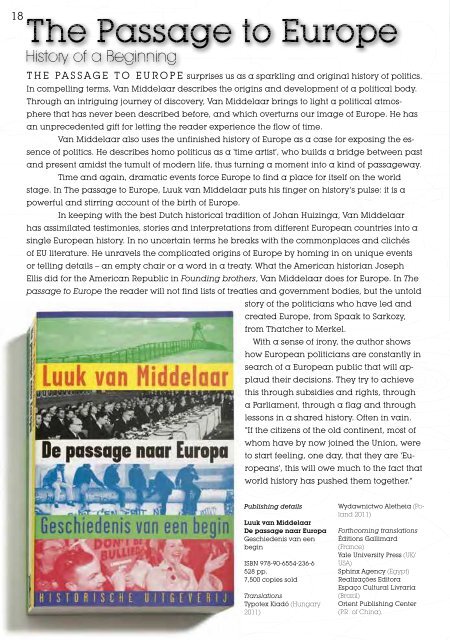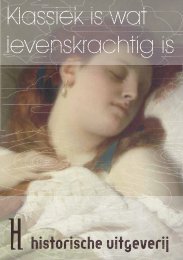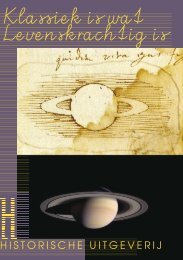IN THE MORE THAN - Historische Uitgeverij
IN THE MORE THAN - Historische Uitgeverij
IN THE MORE THAN - Historische Uitgeverij
You also want an ePaper? Increase the reach of your titles
YUMPU automatically turns print PDFs into web optimized ePapers that Google loves.
18<br />
The Passage to Europe<br />
History of a Beginning<br />
T H E PA S S A G E T O E U R O P E surprises us as a sparkling and original history of politics.<br />
In compelling terms, Van Middelaar describes the origins and development of a political body.<br />
Through an intriguing journey of discovery, Van Middelaar brings to light a political atmosphere<br />
that has never been described before, and which overturns our image of Europe. He has<br />
an unprecedented gift for letting the reader experience the flow of time.<br />
Van Middelaar also uses the unfinished history of Europe as a case for exposing the essence<br />
of politics. He describes homo politicus as a ‘time artist’, who builds a bridge between past<br />
and present amidst the tumult of modern life, thus turning a moment into a kind of passageway.<br />
Time and again, dramatic events force Europe to find a place for itself on the world<br />
stage. In The passage to Europe, Luuk van Middelaar puts his finger on history’s pulse: it is a<br />
powerful and stirring account of the birth of Europe.<br />
In keeping with the best Dutch historical tradition of Johan Huizinga, Van Middelaar<br />
has assimilated testimonies, stories and interpretations from different European countries into a<br />
single European history. In no uncertain terms he breaks with the commonplaces and clichés<br />
of EU literature. He unravels the complicated origins of Europe by homing in on unique events<br />
or telling details – an empty chair or a word in a treaty. What the American historian Joseph<br />
Ellis did for the American Republic in Founding brothers, Van Middelaar does for Europe. In The<br />
passage to Europe the reader will not find lists of treaties and government bodies, but the untold<br />
story of the politicians who have led and<br />
created Europe, from Spaak to Sarkozy,<br />
from Thatcher to Merkel.<br />
With a sense of irony, the author shows<br />
how European politicians are constantly in<br />
search of a European public that will applaud<br />
their decisions. They try to achieve<br />
this through subsidies and rights, through<br />
a Parliament, through a flag and through<br />
lessons in a shared history. Often in vain.<br />
“If the citizens of the old continent, most of<br />
whom have by now joined the Union, were<br />
to start feeling, one day, that they are ‘Europeans’,<br />
this will owe much to the fact that<br />
world history has pushed them together.”<br />
Publishing details<br />
Luuk van Middelaar<br />
De passage naar Europa<br />
Geschiedenis van een<br />
begin<br />
ISBN 978-90-6554-236-6<br />
528 pp.<br />
7,500 copies sold<br />
Translations<br />
Typotex Kiadó (Hungary<br />
2011)<br />
Wydawnictwo Aletheia (Poland<br />
2011)<br />
Forthcoming translations<br />
Éditions Gallimard<br />
(France)<br />
Yale University Press (UK/<br />
USA)<br />
Sphinx Agency (Egypt)<br />
Realizações Editora<br />
Espaço Cultural Livraria<br />
(Brazil)<br />
Orient Publishing Center<br />
(P.R. of China).<br />
Politicide<br />
The Assassination of Politics in French Philosophy<br />
E V E N M O R E T H A N the highly praised Passage naar Europa (Passage to Europe), Luuk<br />
van Middelaar’s debut Politicide. De moord op de politiek in de Franse filosofie (Politicide. The<br />
Assassination of Politics in French Philosophy) reads like ‘a philosophical whodunnit’. The leading<br />
role is played by Alexandre Kojève, a professor of philosophy emigrated from Russia. With<br />
his brilliant lectures on Hegel in 1930s Paris he would decisively influence French philosophy.<br />
The lectures were attended by virtually the whole new generation of French intellectuals, Maurice<br />
Merleau-Ponty, Jean-Paul Sartre, Raymond Aron, Georges Bataille, Jacques Lacan, Raymond<br />
Queneau and André Breton. Kojéve’s profound influence also extended to the so-called<br />
‘New Philosophers’, led by the ‘white-shirted thinker’ Bernard-Henri Lévy, and has left French<br />
political philosophy straddled between terror and utopia.<br />
In Politicide Luuk van Middelaar describes the assassination of politics in French philosophy in<br />
the period that French philosophy gained<br />
worldwide influence, from 1945 to 1989. It is<br />
a revealing argument, which gives a finely<br />
etched picture of the intense war of ideas<br />
between philosophy and politics.<br />
Van Middelaar’s indictment of the assassination<br />
of politics in French philosophy<br />
is not only a compelling story, but also an<br />
infectious eulogy on politics. For the first<br />
time van Middelaar here tests his concept<br />
of the homo politicus, which he partly owes<br />
to Machiavelli, the first political philosopher:<br />
‘the good is not the same always and<br />
everywhere.’<br />
Publishing details<br />
Luuk van Middelaar<br />
Politicide<br />
De moord op de politiek in<br />
de Franse filosofie<br />
ISBN 978-90-6554-220-5<br />
260 pp., 5 (black and<br />
white) illustrations<br />
7,000 copies sold<br />
Forthcoming translation<br />
Realizações Editora<br />
Espaço Cultural Livraria<br />
(Brazil).<br />
19




